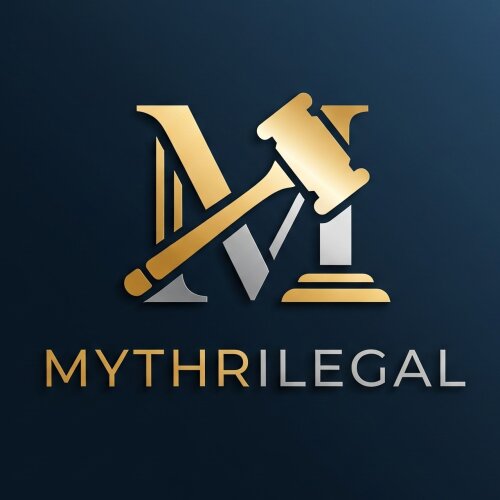Best Collaborative Law Lawyers in Hyderabad
Share your needs with us, get contacted by law firms.
Free. Takes 2 min.
Free Guide to Hiring a Family Lawyer
List of the best lawyers in Hyderabad, India
About Collaborative Law in Hyderabad, India
Collaborative Law is a legal process enabling couples who have decided to separate or end their marriage to work with their lawyers and, on occasion, other family professionals in order to avoid the uncertain outcome of court and to achieve a settlement that best meets the specific needs of both parties and their children without the underlying threat of litigation. Although Collaborative Law is a relatively new concept in India, it is gaining traction in urban areas like Hyderabad where people are looking for amicable ways to resolve disputes, particularly in matrimonial and family matters.
Why You May Need a Lawyer
Individuals may require legal help in Collaborative Law for a number of reasons which may include marital disputes, property settlements, child custody, and other family law matters. The process involves both parties retaining separate attorneys whose role is to help them settle the dispute. Unlike traditional litigation, if the collaborative process breaks down, the lawyers involved must withdraw, and both parties must start over with new legal representation if they wish to pursue litigation. A lawyer experienced in Collaborative Law can provide advice, support, and advocacy throughout this process while focusing on negotiation and settlement.
Local Laws Overview
The key aspects of local laws relevant to Collaborative Law in Hyderabad predominantly involve Indian family law, which is governed by various acts pertaining to marriage, divorce, maintenance, child custody, and property distribution. The laws applicable can differ based on the religion of the individuals involved, including the Hindu Marriage Act, the Indian Divorce Act (for Christians), the Parsi Marriage and Divorce Act, and the Muslim Personal Law (Shariat) Application Act. Additionally, the Indian judicial system encourages out-of-court settlements, which is the essence of Collaborative Law, to reduce the burden on courts and promote amicable resolutions.
Frequently Asked Questions
What is the difference between Collaborative Law and mediation?
Collaborative Law involves both parties working with their lawyers to reach a settlement, while mediation involves a neutral third-party mediator who helps all parties find a compromise. Collaborative Law typically has each party's lawyer present during negotiations, while in mediation, lawyers may not always be present.
Can Collaborative Law be used in non-family law cases?
While Collaborative Law is most commonly associated with family law, it can also be used in other types of civil disputes where the parties seek an amicable resolution without litigation.
How long does the Collaborative Law process usually take in Hyderabad?
The duration of the Collaborative Law process can vary widely based on the complexity of the case and the willingness of the parties to cooperate. It may take several months or longer to reach a resolution.
Are agreements reached through Collaborative Law legally binding?
Yes, agreements reached through Collaborative Law are drafted into a contract known as a settlement agreement, which can be legally binding if it meets all legal requirements and is duly executed.
What happens if we cannot reach an agreement through Collaborative Law?
If an agreement cannot be reached, the collaborative process terminates, and both parties must seek new representation if they wish to pursue the matter through litigation, as the collaborative lawyers are precluded from further involvement.
Are Collaborative Law professionals available in Hyderabad?
Yes, there are legal professionals in Hyderabad who specialize in Collaborative Law, though it's important to seek out those with specific experience and training in this area.
Is Collaborative Law more cost-effective than traditional litigation?
Collaborative Law can be more cost-effective than traditional litigation as it often requires less time in court, reducing legal fees and court costs. Nonetheless, this can vary case by case.
How private is the Collaborative Law process compared to court proceedings?
The Collaborative Law process is generally private, with discussions and negotiations taking place in a confidential setting, unlike court proceedings which are often public.
Will my religious background affect the Collaborative Law process?
Your religious background may influence the applicable family law statutes but does not affect the collaborative process itself, which is more about the method of resolving disputes than the applicable law.
Can any lawyer practice Collaborative Law?
To practice Collaborative Law, a lawyer needs to undergo specific training in collaborative practices and negotiation skills. It is advised to consult with a lawyer who has this specialized training.
Additional Resources
For additional support and resources on Collaborative Law, individuals can contact the local bar association in Hyderabad, as well as family counseling centers and mediator networks that offer collaborative services. Some NGOs and legal aid societies may also provide assistance and information on non-adversarial dispute resolution methods including Collaborative Law.
Next Steps
If you are in need of legal assistance in Collaborative Law, the next step would be to research and contact a lawyer or a law firm in Hyderabad that specializes in family law and has experience with Collaborative Law. Ensure that they have the requisite training in collaborative techniques and can represent your interests effectively in a collaborative setting. With the right preparation and legal counsel, you can approach your legal issue collaboratively, aiming for a resolution that benefits all involved parties.
Lawzana helps you find the best lawyers and law firms in Hyderabad through a curated and pre-screened list of qualified legal professionals. Our platform offers rankings and detailed profiles of attorneys and law firms, allowing you to compare based on practice areas, including Collaborative Law, experience, and client feedback.
Each profile includes a description of the firm's areas of practice, client reviews, team members and partners, year of establishment, spoken languages, office locations, contact information, social media presence, and any published articles or resources. Most firms on our platform speak English and are experienced in both local and international legal matters.
Get a quote from top-rated law firms in Hyderabad, India — quickly, securely, and without unnecessary hassle.
Disclaimer:
The information provided on this page is for general informational purposes only and does not constitute legal advice. While we strive to ensure the accuracy and relevance of the content, legal information may change over time, and interpretations of the law can vary. You should always consult with a qualified legal professional for advice specific to your situation.
We disclaim all liability for actions taken or not taken based on the content of this page. If you believe any information is incorrect or outdated, please contact us, and we will review and update it where appropriate.

















